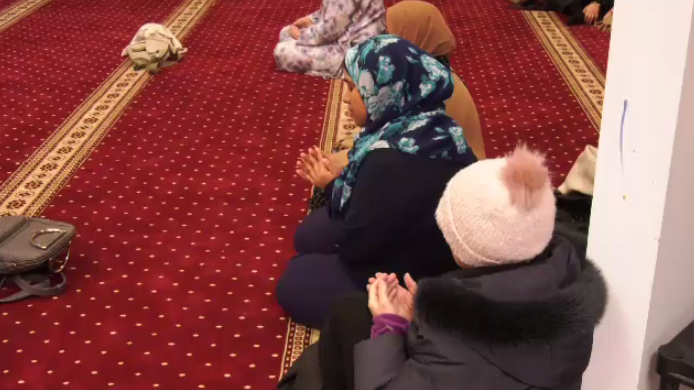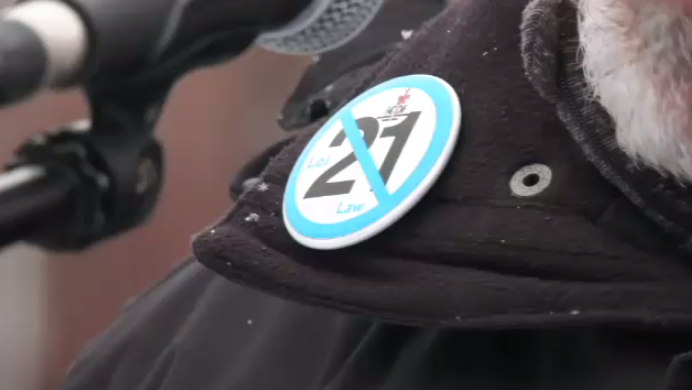'The sorrow doesn't go away:' Commemoration for victims of Quebec City mosque shooting
Montrealers gathered Friday to commemorate victims of the Quebec City mosque shooting nearly six years ago.
Afternoon prayers at the Verdun Islamic Centre also included a moment of reflection for those killed in the 2017 attack.
"Believe me, the sorrow doesn't go away. Yes, we life our live and this is nature. But the sorry is in our hearts everyday," said Samer Mazjoub, president of the Canadian Muslim Forum.
On Jan. 29, 2017, six men were killed and five critically injured shortly after evening prayer at the Quebec City Islamic Cultural Centre.
The victims were professor Khaled Belkacemi, 60; pharmacy worker Aboubaker Thabti, 44; grocery store owner Azzeddine Soufiane, 57, the owner of a local grocery store; accounting technician Mamadou Tanou Barry, 42; computer analyst Abdelkrim Hassane, 41; and IT worker Ibrahima Barry, 39.
The gunman, who was 27 at the time, pleaded guilty to the murders in 2018.
The shooter told police he felt compelled to act for fear that immigrants would kill his family, and told psychiatric evaluators he "wanted glory."
A judge said the shooter had a "visceral hatred for immigrants who are Muslims."
 Afternoon prayers at the Verdun Islamic Centre on Jan. 27, 2023 included a moment of silence for those killed in the 2017 Quebec City mosque shooting. (CTV News/Kelly Greig)
Afternoon prayers at the Verdun Islamic Centre on Jan. 27, 2023 included a moment of silence for those killed in the 2017 Quebec City mosque shooting. (CTV News/Kelly Greig)
For Ahmed Chihane, president of the Verdun Islamic Centre, the tragedy is a painful reminder of the reality many Quebec Muslims face.
"[It's] the problem of Islamaphobia here in Quebec, which is rising every day," he said.
According to Montreal police, the number of hate incidents based on religion rose from 32 to 40 between 2020 and 2021.
And in Quebec City, the number of hate crimes rose for the fourth year in a row.
"This might happen to any one of us," Chihane concluded.
For this reason, Friday's event was more than a commemoration -- it was a call to action.
"Bringing everyone here in front of the mosque to talk about the actions we can do to counter Islamophobia is really important," said Stephen Brown, CEO of the National Council of Canadian Muslims.
Those actions include addressing racial profiling by authorities like police, and creating better tools to help people report intimidation or hate crimes.
According to Brown, many are also hoping for changes to Quebec's secularism law, Bill 21.
 A speaker wears an anti-Bill 21 pin at a Montreal commemoration on Jan. 27, 2023 for victims of the 2017 Quebec City mosque shooting. (CTV News/Kelly Greig)
A speaker wears an anti-Bill 21 pin at a Montreal commemoration on Jan. 27, 2023 for victims of the 2017 Quebec City mosque shooting. (CTV News/Kelly Greig)
"A major source of public tension right now is Bill 21," said Brown. "In a situation where it allows you to take people's rights without justifications means we don't have rights, we have permissions."
Bill 21 prohibits government employees from wearing religious symbols, including head and face coverings.
Many religious groups and civil rights advocates have argued the bill disproportionately affects racialized and immigrant groups, particularly Muslim women.
But the Quebec government has maintained that the law is "reasonable."
Quebec Premier Francois Legault has also denied claims that Islamaphobia is an issue in Quebec.
However, many members of the Muslim community feel differently.
"We should not beg for tolerance and acceptance," said Mazjoub of the Canadian Muslim Forum. "We are citizens. To make a whole community feel like they need to beg for tolerance and acceptance is extremely bad."
CTVNews.ca Top Stories

Spectacular aurora light show to be seen across Canada Friday night
A rare and severe solar storm is expected to bring spectacular displays of the northern lights, also known as aurora borealis, across much of Canada and parts of the United States on Friday night.
'Tactical evacuations' underway near Fort Nelson, B.C., as wildfires encroach
The BC Wildfire Service says 'tactical evacuations' began Friday near Fort Nelson, B.C., due to an out-of-control wildfire that has grown rapidly since it was discovered earlier in the afternoon.
Snowbirds in Vancouver for puck-drop flyby as Canucks face Oilers
The Canadian Forces Snowbirds will be performing a flyover across downtown Vancouver at the start of tonight's Stanley Cup playoff game between the Canucks and the Edmonton Oilers.
McGill University seeks emergency injunction to dismantle pro-Palestinian encampment
McGill University has filed a request for an injunction to have the pro-Palestinian encampment removed from its campus.
Which Canadian cities have the highest and lowest grocery prices?
Where you live plays a big factor in what you pay at the grocery store. And while it's no secret the same item may have a different price depending on the store, city or province, we wanted to see just how big the differences are, and why.
Swarm of 20,000 bees gather around woman’s car west of Toronto
A swarm of roughly 20,000 bees gathered around a woman’s car in the parking lot of Burlington Centre.
Video shows naked raccoon catching B.C. family by surprise
When Marvin Henschel spotted a strange and hairless creature wandering through a front lawn in B.C.'s Lower Mainland, he could barely believe his eyes.
Barron Trump declines to serve as an RNC delegate
Former U.S. President Donald Trump's youngest son, Barron Trump, has declined to serve as a delegate at this summer’s Republican National Convention, according to a senior Trump campaign adviser and a statement from Melania Trump's office.
Out-of-control wildfire prompts evacuation alert for Fort McMurray, Saprae Creek Estates Friday night
An evacuation alert was issued for two Wood Buffalo communities Friday night, as crews battled an out-of-control wildfire near Fort McMurray.

































